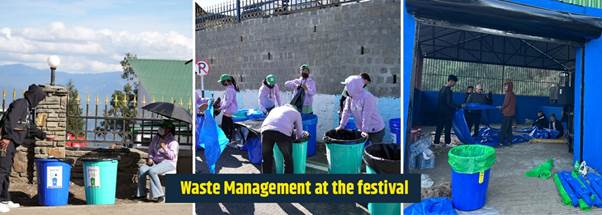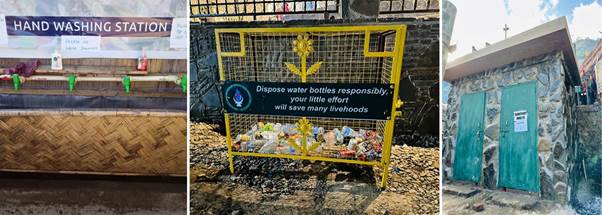The 25th edition of the Hornbill Festival, known as the “Festival of Festivals,” has taken a significant step towards sustainability by becoming a Zero-Waste and Single-Use Plastic (SUP)-Free event.
Celebrating Nagaland’s rich cultural heritage, the festival has set a powerful example in eco-friendly event management.
With more than 2 lakh visitors attending daily, this initiative highlights a commitment to environmental conservation and sustainable practices.
The festival was inaugurated by Nagaland Chief Minister Neiphiu Rio, who emphasised the event's alignment with global sustainability goals.
The Hornbill Festival now seeks to become a benchmark for eco-friendly events in India, blending cultural celebration with environmental responsibility.
To meet its sustainability goals, the organisers implemented a comprehensive waste management system. Single-use plastics such as straws, disposable plates, cups, and plastic bags were banned.
Vendors were required to adopt sustainable alternatives, including bamboo straws, biodegradable cutlery, leaf-based plates, and paper bags.

These eco-friendly materials helped reduce waste while promoting a cleaner, greener environment.
Dedicated enforcement teams and volunteers were present to ensure compliance with the new guidelines. They provided guidance to vendors and visitors, ensuring that only approved materials were used.
Informational signage and awareness campaigns further encouraged eco-conscious choices, fostering a culture of sustainability.
A key element of the festival’s success was its waste management system.
Segregated bins for wet, dry, and recyclable waste were placed throughout the venue, with volunteers assisting in ensuring proper disposal.

A dry waste sorting station processed collected materials, which were sent to authorised centres for recycling, while wet waste was composted on-site for use in local agricultural fields.
Food stalls also adhered to eco-friendly practices, using reusable or compostable utensils, such as banana leaves and bagasse-based plates.
Visitors were encouraged to bring their own utensils or purchase reusable ones. To reduce plastic waste further, water refilling stations were set up, promoting the use of refillable bottles.
The festival also featured 42 toilets, 36 of which were in the Morung (food area), and 6 in public locations.

These were regularly cleaned and maintained throughout the event.
Educational campaigns, or IEC campaigns, played a pivotal role in raising awareness about sustainable practices.
Real-time guides and tips were displayed across the venue, while volunteers conducted on-the-spot awareness sessions to ensure guests understood the zero-waste protocols.
The environmental impact of the festival’s zero-waste approach has been substantial.
Over the 10-day event, approximately 1 lakh SUP items were avoided each day, totalling around 1 million fewer items.
This has led to a significant reduction in plastic waste, contributing to a decrease in the region’s carbon footprint by avoiding over 50 metric tons of CO₂ emissions.
The success of the Hornbill Festival’s zero-waste initiative provides a model for large-scale events worldwide.
By adopting similar practices, public events, festivals, and gatherings can reduce their environmental impact, combat plastic pollution, and contribute to global climate goals.





